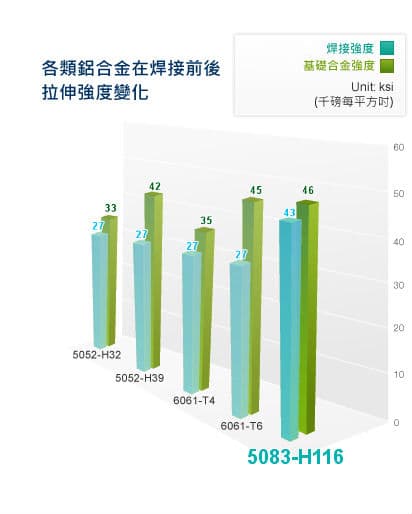TECHNOLOGY PATENTS
- Home
- Technology
- 5083 Aluminum
5083 aluminum alloy
This weather-resistant, corrosion-resistant aluminum alloy is used in numerous commercial and naval vessels worldwide and boasts the highest strength of all non-heat-treatable aluminum alloys.

The main structure of the Morningstar series boats produced by our company, including the hull, keel and frame, are all made of 5083 ocean-grade ship aluminum alloy.
Most small boats of similar size on the market are made of 5052 aluminum alloy. Although 5052 is easier to process and form, 5083 can provide about 1.5 times the tensile and yield strength. (According to data provided by Alcoa aluminum smelters: [1])
Tensile strength refers to the maximum stress that a material can withstand before it breaks. Yield strength refers to a material's ability to resist even a small amount of plastic deformation. Beyond this limit, the material will not return to its original shape, exhibiting permanent deformation.
Specifically, this means that, given the same thickness and other conditions, a boat primarily constructed of 5083 aluminum alloy can withstand greater stresses during impact than boats primarily constructed of fiberglass, steel, or 5052 aluminum alloy without breaking or deforming.
The same ingenuity and technology are also used to manufacture the side hulls and aft deck. Finally, robotic arms precisely weld these panels together to form the rigid, streamlined, aluminum hydro hull.
5083 also exhibits excellent weldability. According to ESAB (a major international welding equipment manufacturer), compared to other aluminum alloys, 5083 loses only 7% of its tensile strength around the weld zone, while 5052 loses 19% to 36% of its tensile strength after welding. [2] Heat-treatable alloys such as 6061 may lose around 80% of their tensile strength around the heat-affected zone of the weld. [3]
Most small boats of similar size on the market are made of 5052 aluminum alloy. Although 5052 is easier to process and form, 5083 can provide about 1.5 times the tensile and yield strength. (According to data provided by Alcoa aluminum smelters: [1])
Tensile strength refers to the maximum stress that a material can withstand before it breaks. Yield strength refers to a material's ability to resist even a small amount of plastic deformation. Beyond this limit, the material will not return to its original shape, exhibiting permanent deformation.
Specifically, this means that, given the same thickness and other conditions, a boat primarily constructed of 5083 aluminum alloy can withstand greater stresses during impact than boats primarily constructed of fiberglass, steel, or 5052 aluminum alloy without breaking or deforming.
The same ingenuity and technology are also used to manufacture the side hulls and aft deck. Finally, robotic arms precisely weld these panels together to form the rigid, streamlined, aluminum hydro hull.
5083 also exhibits excellent weldability. According to ESAB (a major international welding equipment manufacturer), compared to other aluminum alloys, 5083 loses only 7% of its tensile strength around the weld zone, while 5052 loses 19% to 36% of its tensile strength after welding. [2] Heat-treatable alloys such as 6061 may lose around 80% of their tensile strength around the heat-affected zone of the weld. [3]
Our company has over 20 years of experience in metal forming and has invested significantly in R&D and equipment. Compared to smaller or newer manufacturers, we have greater technical capabilities and can use higher-quality alloys that are difficult to form and process.
Upon request, we can provide DNV (Det Norske Veritas) certification documents for the aluminum used in the ship hull.
This weather-resistant, corrosion-resistant alloy has the highest strength of all non-heat-treatable aluminum alloys and is used in many commercial and naval vessels worldwide.
Upon request, we can provide DNV (Det Norske Veritas) certification documents for the aluminum used in the ship hull.
This weather-resistant, corrosion-resistant alloy has the highest strength of all non-heat-treatable aluminum alloys and is used in many commercial and naval vessels worldwide.
- References: (English, external links)
- [1] Alcoa - Sheet and Plate (from: www.alcoa.com)
- [2] ESAB - How Welding Affects the Heat-Affected Zone (HAZ) Around the Weld Bead (from: www.esabna.com)
- [3] Wikipedia - 6061 Aluminum Alloy (from: www.wikipedia.org)
